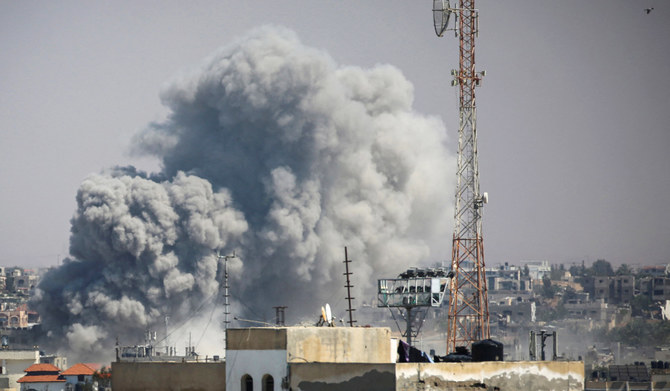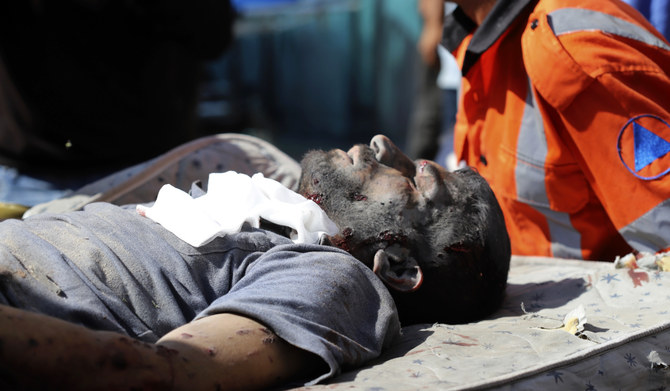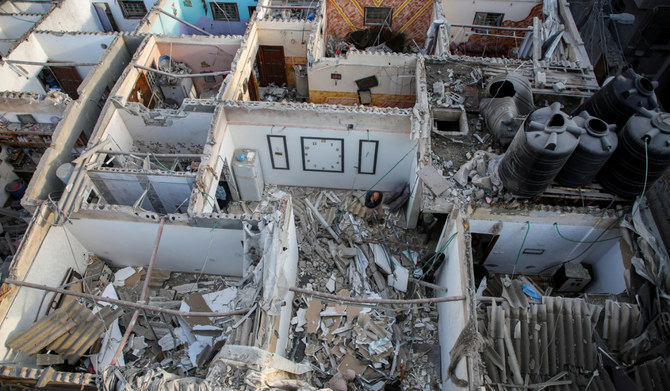JERUSALEM: An announcement by Hamas late Monday that it had accepted a ceasefire proposal sent people in the streets of Rafah into temporary jubilation, as Palestinian evacuees in the jam-packed town felt their first glimmer of hope the war could end.
For families of Israeli hostages held in Gaza, the announcement raised the possibility that their long wait was coming to an end — that they might soon see their loved ones.
But the fervor was short-lived.
A few hours after Hamas’ announcement, Israel rejected the proposal — which was different from one the two sides had been discussing for days — and said it was sending a team of negotiators for a new round of talks.
By Tuesday morning, Israeli tanks had rolled into Rafah, cementing the dashed hopes among Israelis and Palestinians of any imminent ceasefire.
In Rafah, disillusioned Palestinians spent Tuesday packing up their belongings and preparing to evacuate.
Families of Israeli hostages were incensed, too, and thousands of protesters demonstrated late into the night across the country.
GAZA: PALESTINIANS EVACUATE, CONDEMN COLLAPSE OF DEAL
Across Gaza, Palestinians have been demanding a ceasefire for months, hoping that a stop to the fighting will bring an end to the suffering.
Over 34,000 Palestinians in Gaza have been killed by Israeli fire and airstrikes since the war erupted on Oct. 7., according to the Hamas-run Health Ministry. That day, Hamas militants killed about 1,200 in Israel and took around 250 hostages.
An estimated 100 hostages and the remains of 30 others are still held by Hamas, which insists it will not release them unless Israel ends the war and withdraws from Gaza.
Hundreds of thousands in Gaza have been displaced, many sheltering in nylon tents in Gaza’s south, as “a full-blown famine” develops in the north of the enclave, according to the United Nations.
So when the news came out that Hamas had accepted a ceasefire proposal put forward by Egypt and Qatar, Palestinians poured onto the streets, carrying children on their shoulders and banging pots and pans in excitement. For a moment, it seemed life would get easier.
But in the early hours of Tuesday, Israeli tanks entered the edge of Rafah and took control of one of the key border crossings between Israel and Gaza. Palestinians in the city loaded their belongings onto large trucks and fled.
“They kept giving us hope and telling us tomorrow, or after tomorrow, a truce will take place,” said Najwa Al-Siksik as drones buzzed over her tent camp. “As you can hear,” she said, “this was happening all night long.”
El-Sisik said she had lost all hope of an eventual deal.
“(Israel) doesn’t care about us or our children,” she said. “It only cares about its people. And (Prime Minister Benjamin) Netanyahu only cares about being at the top.”
Raef Abou Labde, who fled to Rafah from the southern Gaza city of Khan Younis earlier in the war, rode atop a car packed with belongings, headed to what was sure to be yet another temporary refuge. Labde said he had little faith that Netanyahu’s far-right government sincerely wanted a ceasefire deal.
“I hope to God that the truce happens,” he said. “But what I see is that Netanyahu doesn’t want a ceasefire. He wants to displace the Palestinian people to Sinai, destroy Gaza and occupy it.”
ISRAEL: PROTESTS GROW, DEMANDING NEW DEAL NOW
In Israel, the Hamas announcement did not provoke the kind of immediate celebrations seen in Gaza. Many relatives of hostages held in Gaza, who have seen what feels like countless rounds of ceasefire negotiations end with no deal, have grown jaded.
“We won’t believe there’s a deal until we start to see some hostages return home,” said Michael Levy, whose 33-year-old brother, Or Levy, remains in captivity.
Still, the back and forth between Israel and Hamas led to boisterous and sustained protests Monday night. Protesters, led by hostage families, blocked the main highway into Tel Aviv, lighting fires on the road.
Demonstrations also broke out in Jerusalem, Haifa, and Beersheba.
Hostage families slammed the government’s inaction on a possible deal in a hearing at Israel’s parliament Tuesday.
“We see all sorts of explanations — this isn’t the deal that we gave them, Hamas changed it,” said Rotem Cooper, whose father Amiram Cooper was kidnapped Oct. 7. He questioned whether military pressure was an effective bargaining tactic to force Hamas to release additional hostages.
For some, the news indicated that a deal was closer than ever before.
Sharone Lifshitz, whose father, Oded, is a hostage, said she believed the differences between the proposal Hamas had accepted and Israel’s “core demands” were not so wide.
“Hamas are shrewd operators,” she said. “Now it’s going to be hard for Israel to just say ‘no.’”
Others said they hoped Israel’s movement into Rafah Tuesday was a tactic to pressure Hamas into a mutually agreeable deal.
“This is a way to show that Israel is serious about its demands,” said Levy. “Hamas can’t just declare they have agreed to a deal with changed terms.”































